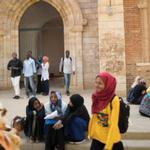Intersectional barriers for Sudanese refugees
War erupted in Sudan in April, with the Sudanese Armed Forces (SAF) and the Rapid Support Forces (RSF) fighting for control over state power and resources. Ceasefires have been futile and people who have taken shelter in their homes are running out of water, food and medicines. The humanitarian situation is dire. 3 million Sudanese are fleeing. Many attempt to cross the borders of neighbouring states, but meet a myriad of obstacles, in part due to different definitions and perceptions of what refugeehood is. In this panel we take an intersectional approach to these obstacles highlighting that “refugees” are diverse and that refugee experiences are shaped by multiple identities such as gender, race, national origin, class, age, (dis)ability and sexual orientation. We ask: what are Sudanese refugees’ experiences? How have they been received by neighbouring states? How have European states responded? How are the experiences and processes gendered and racialized? How does the definition of refugee and migrant impact various intersectional identities’ experiences?
This session is part of the The Sudan-Norway Academic Cooperation (SNAC) project funded by the Royal Embassy in Khartoum, Sudan.
Participants: Munzoul Assal, University of Khartoum; Sara Abbas, Open Society Foundation; Samah Khalaf Allah, University of Bayreuth.
Moderator: Mari Norbakk, CMI.
https://www.lawtransform.no/beex/







